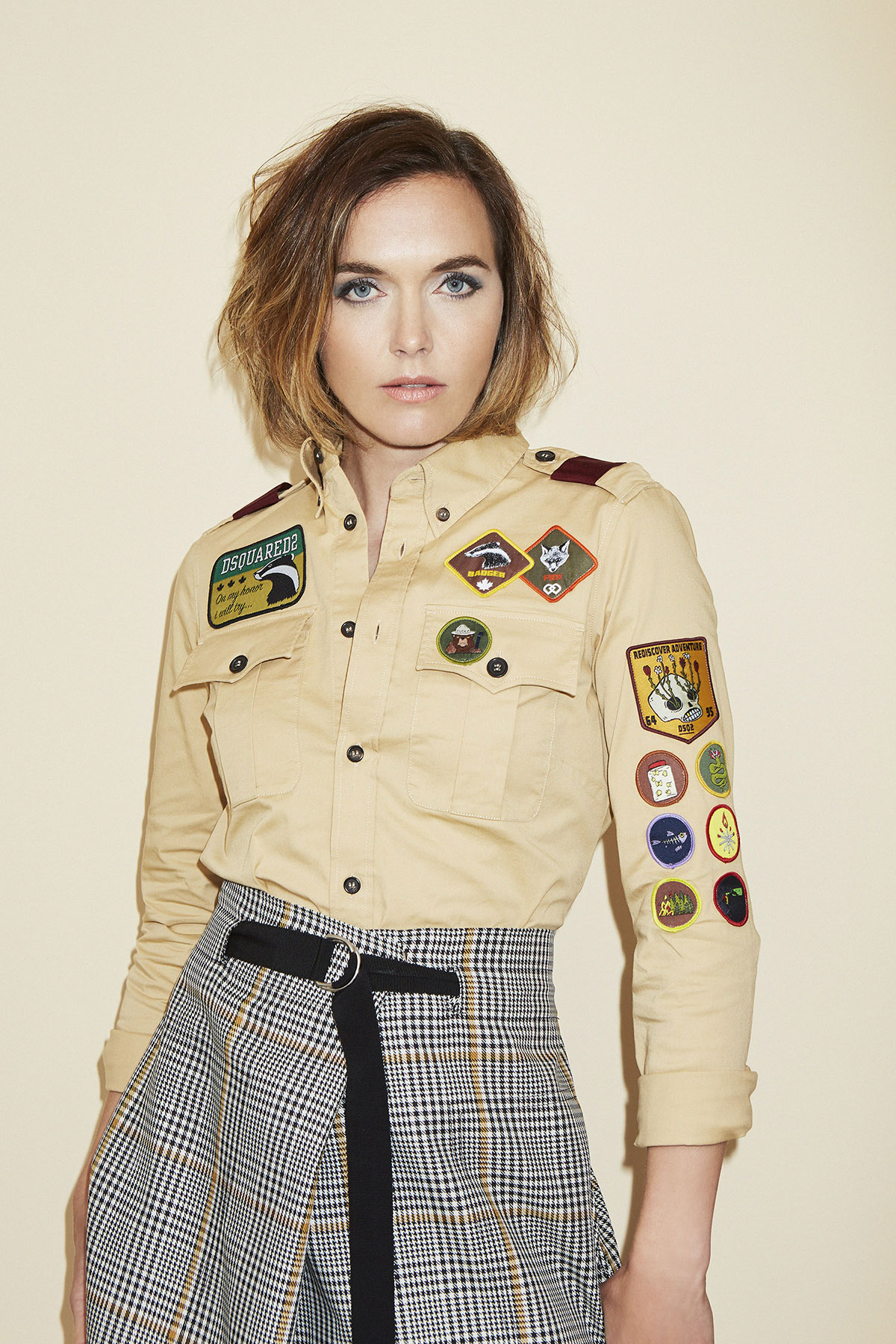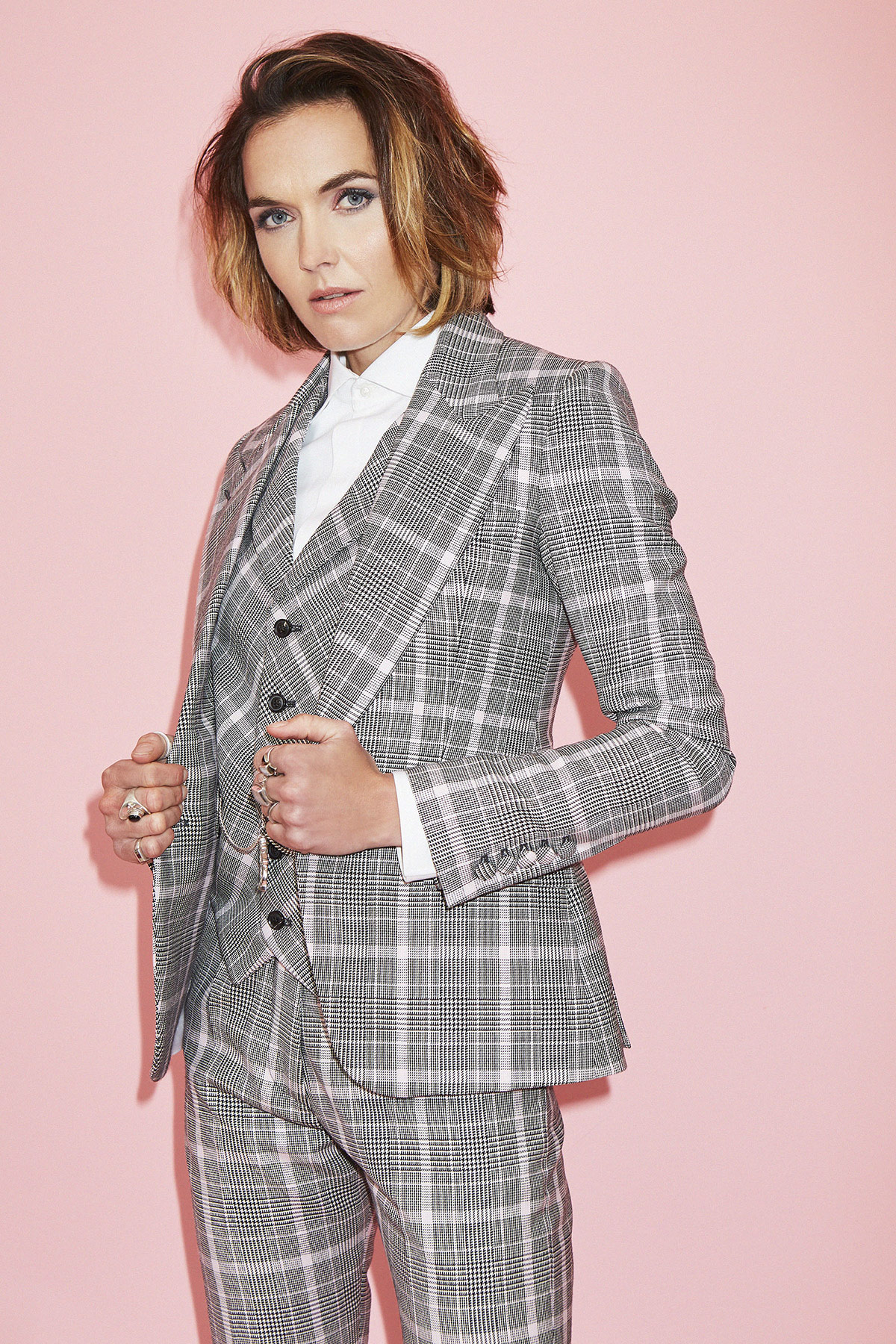The cycling champion turned amateur jockey talks motivation, mental health – and the small matter of climbing Everest
Words Mary-Jane Wiltsher
Photographer Danny Craven
Fashion Editor Deborah Latouche
Hair and Makeup Charlotte Cromer
On an ice-cold day in February, Victoria Pendleton is late for our interview – because she’s helping to get her friend’s car out of a bog. “It’s fitting, I spend most of my free time in wellies,” the Olympic cycling champion subsequently tells me, laughing. We reschedule for later that day, but the mental image chimes with our Lara-Croft-meets-Brown-Owl shoot at the PHOENIX studio a few weeks earlier, which saw Pendleton buttoned into Bond-girl tailoring and shirts peppered with scout-style appliqué patches. Opportunities to dress up are, she says, compensation for spending her formative years “sweating in the gym, dressed like a boy” – a welcome antidote to all those tri-colour tracksuits.
It’s over five years since Bedfordshire’s golden girl (who rode her first cycle race aged nine, spurred on by her successful amateur cyclist father, Max) retired from professional cycling. Her stratospheric career took her to the 2008 Olympics in Beijing, where she scooped sprint gold, and the London Olympics 2012, where she won keirin gold and sprint silver. By the time she bowed out in 2012, Pendleton had a staggering nine World Championship golds to her name. She is one of Britain’s most iconic sportswomen – a bona fide, adjective-defying athlete.

Suit JOSHUA KANE
Shirt DSQUARED2
“I did some skills training in the Alps too, learning rescue techniques, rope knots, getting used to walking with crampons.”

Where do you go after achieving that rarefied level of success? Unsurprisingly, Queen Vic, now 37, has used her ‘retirement’ as an opportunity to master new disciplines, pushing her body in unfamiliar directions with a series of physical challenges that includes Strictly, surfing retreats in Morocco and Costa Rica, and – most unexpectedly – training to become a fully-fledged amateur jockey in just one year. The Switching Saddles project, funded by Betfair, culminated in the Foxhunters Chase at Cheltenham in 2016, where Pendleton crossed the finish line in fifth place. No small feat given that, prior to taking on the challenge, she hadn’t so much as sat on a horse.
Pendleton’s latest expedition, though, quite literally presents the mother of all obstacles. This May, she and TV presenter Ben Fogle will join forces in an attempt to scale Mount Everest, battling 200mph winds to navigate treacherous ridges and icy rock faces before ascending to the top 848 metres known as the ‘death zone’. “My family think I’m crazy,” laughs Pendleton. “Although, in many ways they’re not surprised.”

Training began last year, with the pair spending three weeks climbing some of the biggest peaks in Bolivia’s La Paz under the supervision of the improbably named British mountaineer Kenton Cool, who has summited Everest 12 times. “I did some skills training in the Alps too, learning rescue techniques, rope knots, getting used to walking with crampons,” says Pendleton. As it transpired, moving in slow motion proved more problematic than altitude sickness for the adrenaline junkie. “Really low-level, monotonous discomfort is how I’d describe it. It’s not pain, it’s not maximal effort. The most difficult part is being able to mentally deal with that unsatisfying speed of movement. I’m someone who moves quite rapidly, so I found it hard to take everything slower – every move has to be considered.”
Has she found a kindred spirit in fellow adventurer Fogle? “Oh, Ben is a natural endurance athlete, physically and mentally. I really think it’s in his DNA.” The duo plan to complete the climb in just four weeks, rather than the average six, but Pendleton is quick to point out that they “won’t be rushing up there – something as small as a cold in your system means you don’t climb, so you’ve got to be aware of your body. Being an athlete, that’s something I’m familiar with.”
“Really low-level, monotonous discomfort is how I’d describe [mountaineering]. It’s not pain, it’s not maximal effort. The most difficult part is being able to mentally deal with that unsatisfying speed of movement. I’m someone who moves quite rapidly, so I found it hard to take everything slower.”
It’s that same awareness that Pendleton drew on, three years earlier, when the offer to train with Betfair’s Switching Saddles programme came her way. Taking on a brand new sport in a very public arena was an interesting move for the decorated cyclist, and one she knew would provoke a certain amount of criticism from the racing community. In the end, dissecting the task (right down to the relevant muscle groups) helped make up her mind. “I thought, well, I’ve got good balance as I’ve been wobbling around on skinny tyres most of my life, I’ve got strength in my quads, which is important as a jockey, and I’d love to be able to ride,” she says. “I’ve dealt with pressure, I’m trainable. Physically there was no reason, and mentally there was no reason.”
Team GB eventing coach Yogi Breisner, an Olympic silver medallist for Sweden, supervised Pendleton’s training. The pair clicked instantly – “he was very patient, really exceptional” – though the first lessons were a baptism of (thigh-burning) fire. “The first horse they put me on was this ex-eventer champion horse, which looked to me enormous! They pulled it out the stables and I was like ‘how do I even get up there?’”

Shirt, DSQUARED2
Trousers, AMANDA WAKELEY
Trainers, MCM
Rings, VICTORIA’S OWN

Within a couple of lessons of bouncing around on a lunge-line, working out “how on earth to do a rising trot”, Pendleton was hooked. “There’s such an adrenaline rush from being onboard a thoroughbred,” she says, changing tempo with genuine excitement. “You can feel the power and energy, and that connection with an animal of that calibre is something that gets me in the heart – I can’t explain, I could be sick sometimes and still be overjoyed at how much fun it is! It’s like an extension of your body.”
She recalls the Foxhunter Chase itself as “one of the greatest experiences” of her life. Was it on a par with the Olympic velodrome? “Oh, it goes beyond that, it’s nature,” she says, without skipping a beat. “In track, the variables are very minimal. Here I’m dealing with an animal with a brain of its own. Each horse is different – some headstrong, some compliant. That’s a real thrill.”
When she isn’t up a mountain, Pendleton can be found out in the Oxfordshire countryside, walking her Dobermans and riding the two ex-National Hunt horses that she’s currently retraining to be eventers. The Switching Saddles challenge has clearly gifted her with a full-blown love affair, a sport where she “doesn’t feel the same pressures” as cycling and can “share the load” in a partnership. But when I ask if she wishes she’d discovered horse riding sooner, Pendleton’s mood changes, suddenly serious. “If you’d asked me to ride horses in my early twenties, I couldn’t have done it. I didn’t have the strength, I would have doubted myself from the start.”

Three Piece Suit and Pocket Watch Chain, JOSHUA KANE
Shirt, DSQUARED2
Rings, VICTORIA’S OWN
That sentence encapsulates one of the most interesting things about Pendleton, which is the extreme contrast at the core of her: the sheer force of her drive, and the deep well of her emotional vulnerability. She has often commented that she didn’t fit the Olympian mould, something she puts down to her tendency to wear her heart on her sleeve. The soaring highs of her cycling career were matched by some dark, crushing lows, with her self-confidence crippled by the “huge insecurities surrounding performance” that she suffered throughout her twenties, and Pendleton has spoken openly about her struggles with mental health while training – struggles that lead her to self-harm in the lead up to the Beijing Olympics.
“I’ve always been honest about the way I feel, and there have been many moments of self-doubt,” she says. “I know what it’s like to feel almost superhuman in fitness, and that is an incredible experience, but it comes paired with an immense amount of mental pressure.”
Deep-rooted in those pressures is Pendleton’s relationship with her father, Max, who we circle back to a number of times during our interview. Cycling was part of the fabric of the sports star’s childhood, and some of her most vivid childhood memories are of learning to ride in tandem or racing with her older brother and sister. “I thought everyone did what we did,” she says. “I had no idea, aged six, that it wasn’t the norm. My dad was quite intimidating to the other riders, I think. He’d turn up and they’d say, ‘look, Max is here’. I wanted to have that effect on people, I was in awe of that.”
“I’ve always been honest about the way I feel, and there have been many moments of self-doubt. I know what it’s like to feel almost superhuman in fitness, and that is an incredible experience, but it comes paired with an immense amount of mental pressure.”
When her siblings quit racing, Pendleton was “the last man standing” and in her mind the duty fell to her to carry on the baton. “At the worst stages, I felt like I couldn’t quit, even though I wasn’t sure if it was for me when I got to my teens…”
That undercurrent of responsibility stayed with her, right up to the London Olympics in 2012. When I ask Pendleton to describe the reality – and physicality – of competing in her capital city, with the eyes of the world on her, she paints a darkly vivid picture: “There was a moment where I lay on the floor before the final of the kierin, looking at the ceiling, and I will never forget the way I was feeling. I wanted the world to swallow me up. I cannot explain to you the amount of pressure that you’re trying to contain in your body, behind this calm exterior.”
The image resonates long after our interview, despite her brightly cheerful response when I ask if she’d do it all again: “Oh, one hundred percent. With time everything fades – the pain fades, the intensity fades. It’s strange, when I watch track cycling now, I find it hard to imagine that I ever did it. It almost feels like a dream.”

Three Piece Suit and Pocket Watch Chain, JOSHUA KANE
Shirt, DSQUARED2
Rings, VICTORIA’S OWN
But do it she most certainly did, and now retirement has given Pendleton the time and space to shed the weight of all those expectations, though the experience has proved a double-edged sword. When your sense of self-worth and identity is so bound up in your performance, giving up the latter feels like jumping over a precipice. “Suddenly, that’s all gone, and you’ve got whatever’s left,” is her stark summary.
Today, Pendleton is passionate about improving mental health awareness in sport, not just in the British cycling arena, but on a global level. She is especially interested in how we can minimise the psychological impact of retirement on people in sport. “There definitely needs to be some kind of support system in place to enable people to move on,” she says. “Athletes are kind of institutionalised – they’ve lived in that environment all their lives, and then it’s taken away. It’s probably a bit like being released from prison: ‘what do I do now?’”
Luckily for Pendleton, there’s little danger of being left at a loose end. Between mountaineering and riding, she’s keen to build on the skills she’s learned on the surf retreats hosted by all-female collective Mad To Live, and is currently nose-deep in William Hills’ award-winning Barbarian Days: A Surfing Life. “The retreats are run by a friend of mine, and when she told me about them I thought they sounded amazing. I was a scout growing up and used to love going on the holidays – climbing, potholing, canoeing. They were perfect, and this sounded similar, all with like-minded women.”
And for her next trick? “A motorsport angle is what I’m looking for,” she says, without pausing for breath. “I’m trying to get my license sorted, maybe do a little off-roading… I’d try any sport out there, given half the chance.”
For Victoria Pendleton, retirement is shaping up to be one long, extreme scout holiday. Let’s face it, she’s earned those badges.

MARY-JANE WILTSHER
Editor
Mary-Jane Wiltsher is a London-based journalist and writer. She joined the PHOENIX team in 2013 after completing her MA in Creative & Professional Writing at the University of Roehampton, and became Editor in 2017. Her short fiction has been published by Early Works Press.
